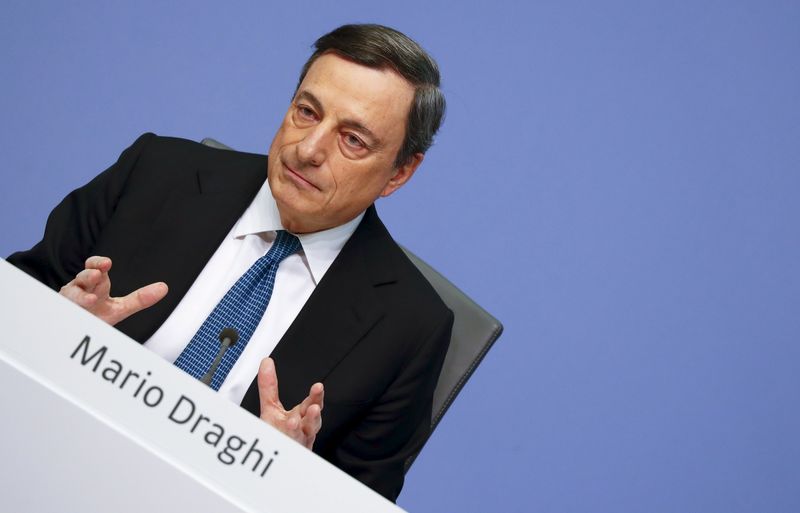By Balazs Koranyi and Francesco Canepa
FRANKFURT (Reuters) - ECB President Mario Draghi is likely to drive home the case for ultra-loose monetary policy on Thursday, hitting back after a barrage of criticism from German officials who dispute the bank's recipe for tackling the euro zone's economic malaise.
Having yet to implement or fully explain some of the measures he announced last month, Draghi is set to give investors more information about the European Central Bank's latest plan to buy corporate bonds.
Widely expected to hold interest rates unchanged at record lows, the ECB will want to see how the two stimulus packages announced since December play out before unveiling any new measure, but Draghi will also reaffirm his guidance for low or even lower rates for many years to come.
The ECB has been easing policy aggressively, cutting rates deeper into negative territory and expanding asset buys in a bid to prop up inflation after sinking oil prices pushed it into negative territory -- all but erasing hope it can lift it back to its 2 percent target over the next two years.
Although market-based inflation expectations have refused to budge, oil prices are rising and the March stimulus package supported both sentiment and financial market conditions, giving the ECB reason for cautious optimism, analysts said.
Indeed, the ECB's biggest headache this time may be a nasty spat with Berlin after Finance Minister Wolfgang Schaeuble said that monetary policy was causing "extraordinary" problems for Germany and was in part to blame for the rise of the right-wing anti-immigration Alternative for Germany (AfD).
"Any conflict between a major stakeholder (Germany) and top management (at the ECB) carries risks," Berenberg analyst Holger Schmieding said.
"It may destabilise the institution and blunt its message," Schmieding said. "The current dispute goes a bit beyond an awkward nuisance. At the margin, it may constrain the ECB's room for maneuver slightly and make ECB monetary policy a little less effective."
The ECB seems to have the edge in the debate for now after Schaeuble backtracked on some of his comments and Bundesbank chief Jens Weidmann, the ECB's biggest critic to date, spoke out in favor of central bank independence, arguing that the ECB's expansionary monetary policy stance was appropriate.
But Schaeuble, who said late on Wednesday it made no sense for interest rates to be at zero or below for a long time, is unlikely to retreat to the sidelines.
Negative rates are hurting Germany's fragmented and cash-saturated banking system disproportionately, raising the prospect that hundreds of smaller banks, primarily small savings banks, could become unviable.
IMF figures suggest German and Portuguese banks would take the biggest earnings hit from falling interest rates, compressing margins and possibly thwarting lending growth.
Draghi will likely reject the German criticism, outlining an even darker path for growth and inflation if the ECB gives up and arguing that the bank makes policy for a 19-member bloc not just one of its members.
EASING FURTHER OUT?
Even if the ECB takes a relatively upbeat stance on Thursday, its longer term prospects have barely improved.
The trade-weighted euro is firming and market-based inflation expectations are well below the ECB's target, suggesting that further policy easing will be again debated later this year.
"Whether the central bank takes measures ultimately depends, as it has in the past, on the development of the economy and inflation," Commerzbank (DE:CBKG) said. "We believe that both should tend to disappoint. Consequently, the ECB will probably become active again, especially if inflation expectations continue to be very low."
The five-year, five-year euro zone breakeven rate
Of particular concern could be the nearly 5 percent rise in the trade-weighted euro since its early December low. A five percent appreciation of the euro dampens inflation by roughly 0.3 percentage points after one year, according to Nordea.
"Although the pace of currency appreciation has not been alarming, the ECB is very likely to be unhappy with the stronger euro," UniCredit said. "However, there is not much the central bank can do about it, at least for now."
"Therefore, the ECB will likely continue its tricky balancing act by, on the one hand, reaffirming in the introductory statement that rates can go lower if needed, and, on the other hand, acknowledging in the Q&A that the downside on rates is not unlimited," the Italian bank added.
(editing by John Stonestreet)
